Just one alcoholic drink a day increases breast cancer risk, according to a new report from American Institute for Cancer Research (AICR) and the World Cancer Research Fund (WCRF).
The report also revealed for the first time that intense exercise decreases the risk of both pre- and post-menopausal breast cancers.
“It can be confusing with single studies when the findings get swept back and forth,” said Anne McTiernan, MD, PhD, a lead author of the report and cancer prevention expert at the Fred Hutchinson Cancer Research Center.
“With this comprehensive and up-to-date report the evidence is clear: Having a physically active lifestyle, maintaining a healthy weight throughout life and limiting alcohol — these are all steps women can take to lower their risk.”
The report analyzed data from over 100 studies, which included over 260,000 cases of breast cancer.
The researchers found that drinking the equivalent of a small glass of beer or wine per day increases pre-menopausal breast cancer risk by 5 percent, and post-menopausal risk by 9 percent.
The report also showed the following:
• Being overweight can increase post-menopausal breast cancer risk
• Mothers who breastfeed have a lower risk of breast cancer
• Weight gain increases the risk of post-menopausal breast cancer risk
The study abstract provided the following methods and results:
Results: Women who were consuming alcohol prior to their breast cancer diagnosis had a nonstatistically significant 24% (95% CI, 0.56–1.04) reduced risk of BCS mortality and a 26% (95% CI, 0.61–0.89) reduced risk of all-cause mortality. Some variation was observed by estrogen receptor (ER) status as alcohol consumption was associated with a 49% (95% CI, 0.31–0.83) reduced risk of BCS mortality among ER− patients with no change in risk observed among ER+patients (HR = 0.97; 95% CI, 0.31–1.54), though the difference between these risks was not statistically significant (P for interaction = 0.39). Postdiagnosis alcohol consumption, and change in consumption patterns after diagnosis, did not appear to be associated with all-cause or BCS mortality.
The good news from this study is that there are step women can take to lower their breast cancer risk.
“Wherever you are with physical activity, try to nudge it up a bit, either a little longer or a little harder. Make simple food shifts to boost protection — substitute veggies like carrots, bell peppers or green salad for chips and crackers and if you drink alcohol, stick to a single drink or less,” says Alice Bender, MS, RDN, AICR’s Head of Nutrition Programs.
“There are no guarantees when it comes to cancer, but it’s empowering to know you can do something to lower your risk.”
The study showing that just one alcoholic drink a day increases breast cancer risk was published in the journal Cancer Epidemiology, Biomarkers & Prevention.
Note: None of the information in our website is intended to diagnose, treat, cure or prevent any illness or disease. The content on our website is for educational purposes only.
Want to reduce breast cancer risk? Chili peppers may be the answer.
Green tea mango breast cancer-fighting smoothie.
Eating fruit when younger reduces breast cancer risk.
REFERENCES:
1. “Drinking after Breast Cancer Won’t Raise Mortality Risk, Study Shows.” Fred Hutch. Fred Hutch, 10 June 2016. Web. 24 May 2017.
2. “Alcohol Use and Breast Cancer Survival among Participants in the Women’s Health Initiative.” Cancer Epidemiology and Prevention Biomarkers. American Association for Cancer Research, 01 Aug. 2016. Web. 24 May 2017.

















